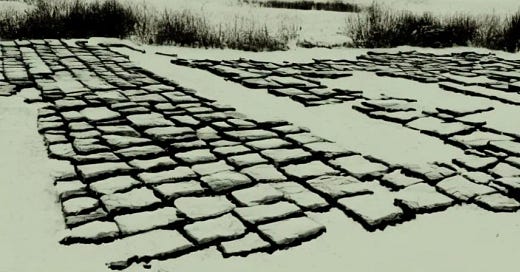[{Intro}, {A}, {B}, {C}, {D)i.}, {D)ii.}, {E)i.}, {E)ii. Conclusion}]
In Marxism, land is a metonym for everything we inherit from the earth and its systems, which are vastly older and of a much larger scope than what mere human minds can comprehend. The first act of capitalism, the “original sin” or rather primitive accumulation, is the enclosure of land, which though it was a precondition for commodity production, today continues in different forms that can be grouped under the term “Imperialism.” These words describe the process of appropriating land into the world capitalist system. As land is appropriated for use by capital, human beings are forcibly removed from the land, severing their connection with their traditional means of subsistence and forcing them onto the labour market. Whatever form it takes, this is open theft perpetrated by overwhelming violence.
This precondition of capitalism, this original sin, is why capitalism is fundamentally incompatible with an ecological or sustainable approach to natural resources. Before it can begin exploiting workers, capital must ensure total control over the land that freely yields its benefits.
“The land (and this, economically speaking, includes water) in its original state in which it supplies man with necessaries or means of subsistence ready to hand is available without any effort on his part as the universal material for human labour. All those things which labour merely separates from immediate connection with their environment are objects of labour spontaneously provided by nature, such as fish caught and separated from their natural element, namely water, timber felled in virgin forests, and ores extracted from their veins. On the other hand, the object of labour counts as raw material when it has already undergone some alteration by means of labour.” (Vol. 1, 284)
When it remains in the depths of a mountain or in a reservoir, raw crude, coal, and biogenic methane are gifts the earth gives to corporations, who pay workers to gather or extract it. This labour turns it into a raw material, the first form of any natural commodity. Crude oil is the raw material of the oil refinery, which is a manufacturing concern. If the extracted product comes out of the ground ready to burn – like biogenic methane and coal – then it becomes the raw material for the transportation industry that is set in motion to deliver the fuel to its consumer. Fuels remain commodities as they run up the value chain, until the moment they are burned, which is when their use-value is realized in work.
“Labour is, first of all, a process between man and nature, a process by which man, through his own actions, mediates, regulates, and controls the metabolism between himself and nature. He confronts the materials of nature as a force of nature. He sets in motion the natural forces which belong to his own body, his arms, legs, head and hands, in order to appropriate the materials of nature in a form adapted to his own needs.” (Vol 1 283).
Here, “first of all” means that this is what labor is in the first instance, at the beginning of the process of extracting something from land and turning it into a commodity. In my reading, it doesn’t mean that labour is exclusively a process between man and nature — it can be a process between two parts of nature, as indeed is reflected in Marx’s understanding of “man” as a part of nature.
Oil’s kinship with the land was realized in the early legal regime of rule of capture, which had to be reversed for the oil industry to grow into absolute domination. As you may know, this was a precept of English common law that stated that a lord could keep whatever game he killed on his own land, even if the animal made its home on a rival’s land. This was a part of the feudal legal regime that had to be overthrown as a precondition for the development of early capitalism; future petrocapitalists fought instead for their right to own the oil when it was still in the ground. This allows the industry to use the oil still underground as a collateral for advanced capital, among other financializations of proven reservoirs. The prorating system that replaced the rule of capture allowed capitalists, a small group of them in close coordination, to autocratically control the rate of the flow of the oil out of the ground and into the economy. This was a necessary precondition because, as was proven time and again in the early 20th century, when competition demands that each firm pull oil out of the ground as quickly as possible, the market floods and what was supposed to become a font of new wealth becomes a massive financial liability.
Marx’s recognition that capitalist accumulation begins by stealing from the land makes the term “ecosocialist” redundant. Protecting the land starts with socialism. Marx gives us an analysis that ties capitalist production to the exploitation of the earth’s systems as much as to the exploitation of labour. “For all its stinginess, capitalist production is thoroughly wasteful with human material, just as its way of distributing its products through trade, and its manner of competition, make it very wasteful of material resources, so that it loses for society what it gains for the individual capitalist” (vol 3, 180).



Excellent post. I'm following this project with great interest.